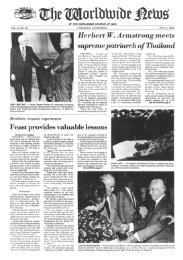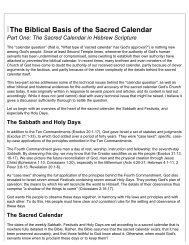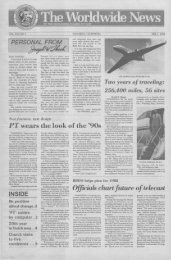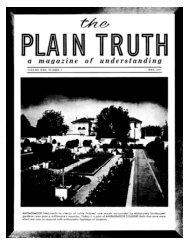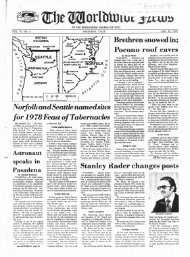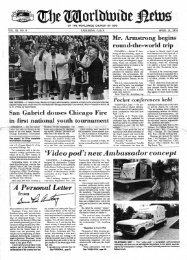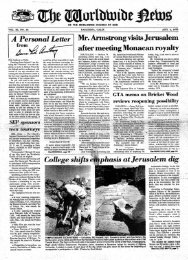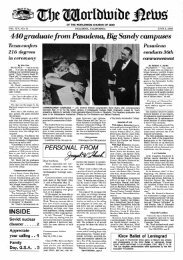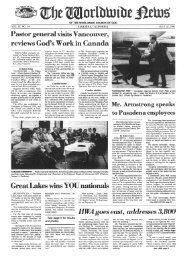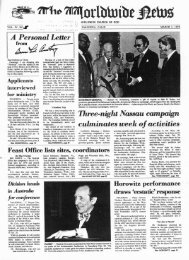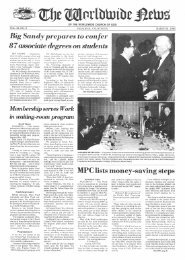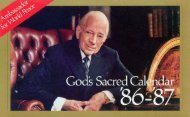BigSandy - Herbert W. Armstrong Library and Archives
BigSandy - Herbert W. Armstrong Library and Archives
BigSandy - Herbert W. Armstrong Library and Archives
Create successful ePaper yourself
Turn your PDF publications into a flip-book with our unique Google optimized e-Paper software.
Monday, June 10, 1991 7<br />
IRON SHARPENS IRON<br />
_SW#_.. a;.. pa. Q~.<br />
Ancient Israel in wilderness:<br />
lessons for the Church today<br />
By David Albert<br />
Apart from Joshua <strong>and</strong> Caleb,<br />
those adults who left Egypt did not<br />
attain the kingdom they were<br />
promised.<br />
How can we be sure that we will<br />
enter God's kingdom?<br />
Evangelist David Albert is a<br />
World Tomorrow presenter.<br />
Since what happened to Israel is<br />
an example for us (I Corinthians<br />
10:1-5) let's look at their mistakes<br />
to see what we should avoid.<br />
Those adults who left Egypt<br />
failed, <strong>and</strong> the apostle Paul, in his<br />
letters to the Corinthians <strong>and</strong><br />
Hebrews, lays heavy emphasis on<br />
why they failed .<br />
Paul tells us to "hold fast the<br />
confidence <strong>and</strong> the reJOlcmg 0 the<br />
hope firm to the end" (Hebrews '<br />
3:6. New King James throughout).<br />
But how do we do that?<br />
Contending with God<br />
After all the trials <strong>and</strong> tests, the<br />
time came when God told ancient<br />
Israel: "Enough is enough. You are<br />
not going into the Promised L<strong>and</strong>."<br />
I rael provoked God' wrath.<br />
They could not enter the Promi ed<br />
L<strong>and</strong> because oftheir attitude.<br />
The IS[iJeJjtes hardened thejr<br />
hearts against God <strong>and</strong> his leaders,<br />
They cootjnnaJly contended with<br />
Moses <strong>and</strong> Aaron <strong>and</strong> ultimately,<br />
ofcourse with God<br />
-To make matter wor e, ~l<br />
j!Ssiwed jlJ-wjJ! to God, interpreting<br />
events in a wrong manner,<br />
drawing \.\Tong conclu ions.<br />
We are wamed to take heed lest<br />
we fall into the same attitude of<br />
contention <strong>and</strong> munnurin~ Other<br />
""vise. God may say to u : ''I've had<br />
enough. You're not going in to my<br />
kingdom with that attitude."<br />
A wrong attitude can <strong>and</strong> will<br />
keep some out ofGod's kingdom.<br />
Implying wrong motives<br />
The story ofthe Exodu seems to<br />
be summed up when I rael (trapped<br />
between Pharaoh' armies, the<br />
mountains <strong>and</strong> the Red Sea) cried<br />
out to Moses with a negative atti-<br />
-llJ,Q.e: ~'s going to happen to<br />
u ? Have you taken u into the<br />
-Wilderne s to dIe'! (Exoous 14: 10<br />
12).<br />
But Moses told the people to<br />
st<strong>and</strong> solI <strong>and</strong> see the salvation of<br />
the Etemal-a positive attitude.<br />
God will deliver. God will intervene.<br />
And God d~<br />
--r'fielf complaint wasn't just<br />
against Moses <strong>and</strong> Aaron. These<br />
attitudes were directly against God.<br />
In spite of Israel's accu ations<br />
against God, he intervened, providing<br />
them bread from heaven. "In<br />
the moming you shall see the glory<br />
of the LORD; for He hears your<br />
murmurings against the LORD"<br />
(Exodus 16:7).<br />
Notice, Israel's murmurin was<br />
a ainst God n<br />
s said:<br />
"What are we? Your murmurings<br />
are not against us but against the<br />
LORD" (verse 8).<br />
Moses <strong>and</strong> Aaron recognized<br />
that they were just God's in truments.<br />
It was God, not them, who<br />
brought Israel into the wilderne .<br />
Israel did not have a trusting. confident<br />
attitude. They did not underst<strong>and</strong><br />
God's way. <strong>and</strong> they were<br />
quick to leap to the most negative<br />
conclusions.<br />
Israel tempted God<br />
God allowed them to be tried,<br />
but he was always ready to intervene<br />
on their behalf.<br />
Psalm 95 <strong>and</strong> Hebrews 3 show<br />
that the people were tempting God<br />
when they asked: "Where is God?<br />
What is he doing?"<br />
All through the wilderne s journey<br />
Israel challenged God <strong>and</strong> hi<br />
servants. Psalm 78: 11 describes this<br />
period also: "[They] forgot His<br />
works <strong>and</strong> His wonders that He had<br />
hown them."<br />
Israel forgot quickly. Where was<br />
the thanks for what God had done?<br />
"And they tested God in their<br />
heart by asking for the food of their<br />
fancy" (verse 18). Oh, that we had<br />
the cucumbers, the garlics, the<br />
leeks, the food we liked in Egypt,<br />
they said. It's better than this stuff<br />
God is giving us.<br />
They often provoked God,<br />
grieved him, tempted him <strong>and</strong> "limited<br />
the Holy One of I rae!. They<br />
did not remember Hi power: the<br />
day when He redeemed them from<br />
the enemy, when He worked Hi<br />
sign in Egypt" (verses 40-43).<br />
Israel limited God by con tantly<br />
Faith is not a natural commodity in the human heart. Disbelief,<br />
skepticism, criticism, worst-case scenario reasoning, negativismthose<br />
flow from the human heart.<br />
questioning whether he could take<br />
care of them, <strong>and</strong> they alway<br />
believed the problem wa insoluble.<br />
After awhile God became tired<br />
of hearing it <strong>and</strong> refused to work<br />
with them.<br />
Worse-case scenario<br />
It never seemed to dawn on<br />
Israel that God hadn't let them die<br />
anywhere along their journey.<br />
But that was not their interpretation.<br />
"Why has the Lord brought us<br />
to this l<strong>and</strong> to fall by the sword,<br />
that our wives <strong>and</strong> children should<br />
become victims?" (Numbers 14:3).<br />
God never intended for Israel to<br />
die in the wilderness or fall victim<br />
to the inhabitants of the l<strong>and</strong>.<br />
That's why God said they have not<br />
understood my ways. They always<br />
err in their hearts. They are always<br />
looking at this wrong.<br />
So they said, "Let us select a<br />
leader <strong>and</strong> return to Egypt" (verse<br />
4).<br />
Here, God draws the line.<br />
Jo hua <strong>and</strong> Caleb tried to encourage<br />
the people. telling them they<br />
could take the l<strong>and</strong> with God's help<br />
(verse 8). They wamed them not to<br />
rebel against God. But the people<br />
threatened to stone them (verse 10).<br />
An evil heart of unbelief<br />
Paul refers to the attitude of<br />
imputing ill-will toward God in<br />
Hebrews 3. It is important for us to<br />
underst<strong>and</strong>, because the e things<br />
are examples for us today.<br />
"Beware, brethren, Ie t there be<br />
in any of you an evil heart of unbelief'<br />
(Hebrews 3: 12).<br />
God's Word i n't ca ual about<br />
the attitude of unbelief. Faithlessne<br />
s. unbelief. a refusal to trust in<br />
God, is a sinful attitude.<br />
This attitude ofchallenging, criticizing,<br />
interpreting everything that<br />
happens in a negative way despite<br />
all signs to the contrary, is evil.<br />
Paul said we should "exhort one<br />
another daily, while it is called<br />
'Today,' lest any of you be hardened<br />
through the deceitfulness of<br />
in" (verse 13).<br />
Israel probably wasn't aware that<br />
they were making a mi take. They<br />
probably didn't think they were<br />
wrong. They thought they had it<br />
figured out, that they knew what<br />
was going on,<br />
They didn't see their sin, because<br />
that's the nature of sin. They<br />
became increasingly hardened in<br />
their attitude of unbelief.<br />
The Israelites wouldn't trust<br />
God. And trust is closely related to<br />
faith.<br />
We must have an enduring faith<br />
in God. "For we have become partakers<br />
of Christ if we hold the<br />
beginning of our confidence steadfastto<br />
the end" (verse 14).<br />
Salvation requires trust in God<br />
Faith is critical to salvation. The<br />
only way we can succeed with God<br />
is by faith. We've got to hold fast<br />
the beginning of our confidence,<br />
teadfast to the end.<br />
Many of us, when we come into<br />
the Church, have great confidence<br />
in everything. Realistically, that<br />
confidence is probably a bit<br />
naive-it was untested <strong>and</strong> it didn't<br />
have all the facts.<br />
But the danger is that acro s time<br />
we do get facts, <strong>and</strong> some of them<br />
are good <strong>and</strong> some of them aren't<br />
so good, <strong>and</strong> we learn things <strong>and</strong><br />
we think we learn things.<br />
Then we begin to draw concluions.<br />
And we begin to see the<br />
human element in ourselves <strong>and</strong><br />
others. And there i a wearing<br />
effect on our faith.<br />
Some people who get into this<br />
attitude of unbelief say such things<br />
a : "Well, what about this? And<br />
what about that? And, did you hear<br />
this other thing?"<br />
That kind of murmuring can<br />
undermine our faith, <strong>and</strong> we can<br />
become hardened. negative <strong>and</strong><br />
cynical.<br />
If we don't hold fast our confidence<br />
in God we are going to be in<br />
trouble. We can't let thi precious<br />
commodity of faith, confidence,<br />
trust or belief slip out ofour grasp.<br />
Faith is not a natural commodity<br />
in the human heart. Disbelief. skeptici<br />
m, criticism, wor t-ca e scenario<br />
reasoning, negativism--thoSe<br />
flow from the human heart.<br />
Our first reaction to change is,<br />
usually, to think the old ways are<br />
better.<br />
We don't often like change. The<br />
old ways are comfortable. So we<br />
have a tendency to complain when<br />
change occurs. but thi is a negative<br />
attitude.<br />
Transcend unbelief<br />
When we don't believe, we<br />
won't obey. If we do believe, then<br />
we will act on what we believe. We<br />
must transcend the attitude ofunbelief<br />
that the Israelite exhibited.<br />
Paul said: "Therefore, since a<br />
promi e remains of entering His<br />
. re t, let us fear lest any ofyou seem<br />
to have come short of it. For indeed<br />
the gospel was preached to us as<br />
well as to them; but the word which<br />
they heard did not profit them, not<br />
being mixed with faith in those<br />
who heard it. For we who have<br />
believed do enter that rest"<br />
(Hebrews 4:1-3).<br />
Our faith is being tested. Life is a<br />
series of tests much like the one<br />
Israel faced. Theirs were physical,<br />
ours can be physical or spiritual.<br />
Paul told the Hebrews, a people<br />
late in their Coo tian experience,<br />
whom he sensed were wavering,<br />
pulling back, losing their confidence,<br />
"Do not cast away your confidence,<br />
which has great reward"<br />
(Hebrews 10:35).<br />
Most brethren have confidence,<br />
their faith <strong>and</strong> positive approach i<br />
uplifting. They are to be admired<br />
for their teadines. their faithfulness,<br />
their positive attitude.<br />
But. do you think God will give<br />
out awards for the critic -for the<br />
most critical member of the<br />
Church, the mo t analytical. who<br />
put the most negative spin on<br />
events.<br />
When we have a positive view of<br />
a change-a doctrinal change. a<br />
procedural change, a personnel<br />
change-<strong>and</strong> a skeptic comes along<br />
<strong>and</strong> ays the worst po ible thing,<br />
our confidence <strong>and</strong> faith can be<br />
injured.<br />
People say critical things, It's<br />
human. It's also satanic. Satan. the<br />
accuser of the brethren, pump out<br />
accu. ations all the time.<br />
Great reward for the faithful<br />
But for the faithful there is going<br />
to be a great reward. There won't<br />
be anything for the critics, the skeptics<br />
<strong>and</strong> the doubters.<br />
We must resist those attitude in<br />
the world <strong>and</strong> in the Church that<br />
war against our faith.<br />
Faith isn't the easiest thing to<br />
keep alive. And faithful people in a<br />
world of skeptics are seen as naive.<br />
There's not much prai e from the<br />
world for being faithful <strong>and</strong> confident.<br />
It's the cynics who look smart.<br />
They've got a little knowledge, <strong>and</strong><br />
they put a certain interpretation to<br />
it, <strong>and</strong> they look wise.<br />
If others shake our confidence in<br />
the Church <strong>and</strong> its leader hip we<br />
hould avoid them <strong>and</strong> cling to<br />
those who liftour spirits.<br />
If we have confidence, we're<br />
going to endure, If we don't have<br />
confidence. we're probably not<br />
going to make it.<br />
Paul continues: "So that after<br />
you have done the will of God, you<br />
may re



